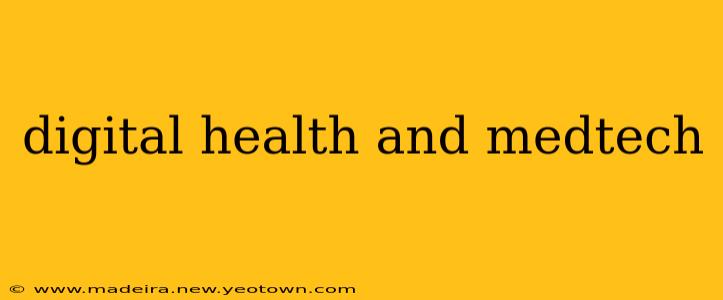Digital Health and Medtech: Revolutionizing Healthcare as We Know It
The world of healthcare is undergoing a seismic shift, driven by the relentless march of technology. Digital health and medtech are no longer buzzwords; they're the driving forces behind a revolution that promises to make healthcare more accessible, efficient, and personalized than ever before. This isn't just about fancy gadgets; it's about fundamentally changing how we prevent, diagnose, and treat illness. Let's delve into this exciting landscape.
Imagine a world where your doctor has access to your complete health history, from your genetic predispositions to your daily activity levels, all in real-time. This isn't science fiction; this is the promise of digital health and medtech. It’s a story of innovation, collaboration, and a relentless pursuit of better patient outcomes. It's a story that's still being written, chapter by chapter, with each new breakthrough and technological advancement.
What is Digital Health?
Digital health encompasses the use of technology to improve healthcare delivery, management, and outcomes. This broad definition includes everything from wearable fitness trackers and telehealth platforms to sophisticated AI-powered diagnostic tools and electronic health records (EHRs). The core aim is to leverage technology to empower both patients and healthcare providers.
What is Medtech?
Medtech, or medical technology, focuses specifically on the development and application of medical devices and instruments. This includes everything from simple diagnostic tools like blood pressure cuffs to complex surgical robots and implantable devices like pacemakers. Medtech plays a crucial role in enabling many of the advancements we see within the broader digital health landscape.
How are Digital Health and Medtech Related?
Digital health and medtech are inextricably linked. Medtech provides the tools and devices, while digital health leverages these technologies to create more efficient and effective healthcare systems. For example, a smart insulin pump (medtech) can be integrated into a diabetes management app (digital health) allowing for real-time data monitoring and adjustments to insulin delivery.
What are the key benefits of digital health and medtech?
The benefits are numerous and far-reaching:
- Improved Access to Care: Telemedicine, enabled by digital health, bridges geographical barriers and makes healthcare more accessible to underserved populations.
- Enhanced Patient Engagement: Wearable devices and personalized health apps promote proactive health management and patient participation in their care.
- More Efficient Healthcare Systems: Digital tools streamline administrative processes, reduce paperwork, and optimize resource allocation.
- Improved Diagnostic Accuracy: AI-powered diagnostic tools can analyze medical images and data with greater accuracy than humans alone, leading to earlier and more precise diagnoses.
- Personalized Medicine: Digital health enables the collection and analysis of vast amounts of patient data, allowing for the development of tailored treatment plans.
- Reduced Healthcare Costs: By improving efficiency and preventing hospital readmissions, digital health can contribute significantly to cost reduction.
What are some examples of digital health and medtech in action?
Let's consider a few concrete examples:
- Remote patient monitoring: Wearable devices track vital signs and transmit data to healthcare providers, enabling timely interventions and reducing the need for hospital visits.
- AI-powered diagnostic tools: Algorithms analyze medical images (X-rays, MRIs, etc.) to detect diseases like cancer at earlier stages, improving treatment outcomes.
- Telemedicine platforms: Virtual consultations allow patients to connect with healthcare providers remotely, eliminating the need for travel and improving access to specialist care.
- Personalized medicine apps: These apps provide tailored health recommendations based on individual genetic predispositions, lifestyle factors, and medical history.
What are the challenges facing the digital health and medtech industry?
Despite its immense potential, the digital health and medtech industry faces several significant challenges:
- Data privacy and security: Protecting patient data is paramount, requiring robust security measures and strict adherence to privacy regulations.
- Regulatory hurdles: The approval process for new medical devices and digital health solutions can be lengthy and complex.
- Interoperability issues: Seamless data exchange between different systems remains a challenge, hindering the efficient use of patient data.
- Digital literacy and access: Ensuring equitable access to technology and addressing digital literacy gaps is crucial for maximizing the benefits of digital health.
- Ethical considerations: The use of AI in healthcare raises ethical questions regarding bias, accountability, and the potential displacement of healthcare professionals.
The future of healthcare is undeniably intertwined with digital health and medtech. As technology continues to advance, we can expect even more innovative solutions to emerge, transforming the way we approach healthcare delivery and ultimately improving the lives of millions. The journey is ongoing, but the destination – a healthier, more equitable, and more accessible healthcare system – is worth the effort.

